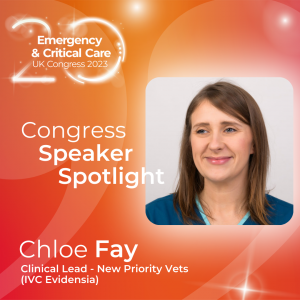 Where did your ECC interest come from?
Where did your ECC interest come from?
While I was at university at Myerscough, part of the University of Central Lancashire, I was working at one of the big ECC hospitals in Manchester. There were many influential vets and nurses, including Louise O’Dwyer, and seeing what they were doing inspired me to go down the ECC route. Pretty much my entire career has been spent doing that. I love that every shift is different and that I get to nurse complex cases and make a difference quickly.
Where are you working now?
I worked for Vets Now for a few years before moving to Brighton and am Clinical Lead at IVC Evidensia clinic New Priory Vets. We cover a large area of out-of-hours, as well as having referrals.
Tell us about your first lecture, Supporting the respiratory patient.
I’ll be talking about respiratory patients, how they present and what we can do as vets and nurses. The emergency management of the respiratory patient is a multifaceted effort which requires stabilisation before diagnostics are even considered. This lecture will address management of the respiratory patient from triage to discharge, including provision of oxygen therapy and creating an individualised plan with the use of monitoring equipment. I’ll talk about the different modalities in which respiratory patients can be supported, including handling, monitoring and chest drain care, as well as discussion of ventilated patients and special considerations for these high intensity patients. We want to do all we can to alleviate stress as any amount of stress can tip them over the edge. We want to consider how we can help them long-term in the hospital, which can be quite a scary place.
What else can delegates expect?
There will be various cases peppered through the lecture for delegates to discuss and a Q&A where anyone can delve into specific elements of it. In our practice we have cardio-respiratory referrals, so we see these cases on a daily basis and it’s one of my strong interests. Those patients are so dependant on us being careful and thoughtful in our handling.
Your second lecture is Using the Rule of 20 in ECC Nursing.
I’ll be doing that alongside my friend and colleague Kath Howie. The Rule of 20 was created by US criticalist Rebecca Kirby and is basically a checklist for vets and nurses to work through with ECC patients to make sure we don’t miss anything. It can be easy to become focused on one thing that’s happening to a patient and forget other things. They perhaps don’t need to be checked all the time, but critical care patients can change quite rapidly, and you need to be aware of what needs checked.
What are a few of the things you’ll be touching on?
We’ll talk about blood glucose, acid-base balance, fluid therapy and even good old fashioned tender loving care.
And your final lecture is Emergency Bloods – what is the minimum database?
In an emergency setting, rapid diagnostics can be extremely useful, alongside a major body system evaluation, to enable timely management of diseases and trauma. This is something I picked up from my time at Vets Now where patients get this minimum database. This lecture will discuss the minimum database blood test components and the advantages of using this “cage side” tool to enable life-saving treatment. There will be a discussion of each of the components and what the results may identify, as well as highlighting their limitations.
How much are you looking forward to Congress?
I’m really excited. I’ve attended frequently as a delegate, so it will be lovely to be back and doing my first lectures. It’s my favourite Congress. The social programme second to none, as well as having great lectures from world-renowned, big-name figures in the veterinary world.


